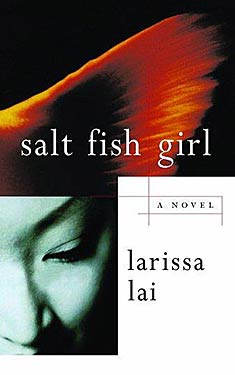Larissa Lai
Completed 5/26/2020,
Reviewed 5/26/2020
4 stars
I loved this
book up to the end, when everything seemed rushed. It has great world-building, great characterization,
and an intriguing double story line which comes together in a fascinating but
clunky way. There’s science fiction, Chinese
creation mythology, and magical realism.
And it uses the odors and the sense of smell as its primary descriptors,
specifically, the urine-peppery smell of the durian fruit. Lots of interesting ingredients that made for
a wholly odd and mostly satisfying story.
The book was nominated for several awards including the Otherwise Award
for its focus on gender issues in genre fiction.
 The first plotline
is about a god-like fish/snake/woman entity that changes shape and is rebirthed
into different people. In the beginning,
she creates humans out of clay. Later
she is bifurcated and becomes human. She
falls in love with the daughter of a man who sells salt fish (hence the
title). The second plotline, told in
alternating chapters, tells the story of Miranda, a girl in a future Canadian
city who is born smelling of the durian fruit. She is ostracized for it in school, her mother
tries to ignore it, but her father has her try Chinese medicine to cure
it. It turns out that there is a
dreaming disease that is spread through the feet that causes people to have
strange odors and dreams of past lives.
The corporate controlled world tries to ignore it, but Miranda is also
having dreams of being someone else.
Thrown into the mix are clones, virtual reality, and a mad scientist who
is studying the dreaming disease phenomenon.
The first plotline
is about a god-like fish/snake/woman entity that changes shape and is rebirthed
into different people. In the beginning,
she creates humans out of clay. Later
she is bifurcated and becomes human. She
falls in love with the daughter of a man who sells salt fish (hence the
title). The second plotline, told in
alternating chapters, tells the story of Miranda, a girl in a future Canadian
city who is born smelling of the durian fruit. She is ostracized for it in school, her mother
tries to ignore it, but her father has her try Chinese medicine to cure
it. It turns out that there is a
dreaming disease that is spread through the feet that causes people to have
strange odors and dreams of past lives.
The corporate controlled world tries to ignore it, but Miranda is also
having dreams of being someone else.
Thrown into the mix are clones, virtual reality, and a mad scientist who
is studying the dreaming disease phenomenon.
The
beginning is a little tough to get into.
It’s hard to see where it's going for the first thirty pages or so. Then it all comes together as Miranda gets older
and when the ageless female character meets the salt fish girl. Then I was hooked. The stories are interesting in themselves
even though you can’t necessarily see how the two will come together until about halfway
or so through the book.
Miranda is a
strange character. She’s likable but
makes a lot of bad choices. By about
halfway through her narrative, you realize that she is going to continue to
make bad choices and you just kind of accept it. She keeps running away from the repercussions,
but always comes back to family.
Eventually, she meets Evie, a clone who she seems to know from her dreams
of a previous life. That relationship
leads to more bad choices, but ultimately brings both plotlines together in the
end.
I thought
the world-building was quite interesting.
In the future, corporations control everything, including where people
live. The middle class has jobs that
they perform using virtual reality.
Miranda’s father is a virtual tax collector and is regularly captured
and beaten for giving money to the poor.
Her mother is a former cabaret singer.
Both parents cowrote songs that made an impact in Serendipity, one of
walled cities controlled by a corporation.
Those who do not have corporate jobs live out in the Unregulated
Zone. They are relegated to factory work,
if they work at all.
This book
tackles a lot of issues: gender, love, sexuality, family, and the fight against
biotechnology. It’s all grounded in
Chinese mythology and tradition. I think
that huge combination is what made it so intriguing for me. I basically read the book in a day. It’s short, but I read it all last evening,
in the middle of the night, and this morning.
The only unsatisfying part was the ending. It all comes together too quickly. I still give the book four stars out of five,
but I think it could have had about fifty more pages to make the ending less
abrupt and enhance the magical realism.
Having had the same experience you describe here, of the ending coming together too quickly, leaving an unsatisfying feeling after a really good read, it makes me truly appreciate when authors can pull off the trifecta: good beginning, middle and end. It has to be much harder than one would think because I've read so many books where the end felt rushed, and there was no need for it to be that way.
ReplyDelete